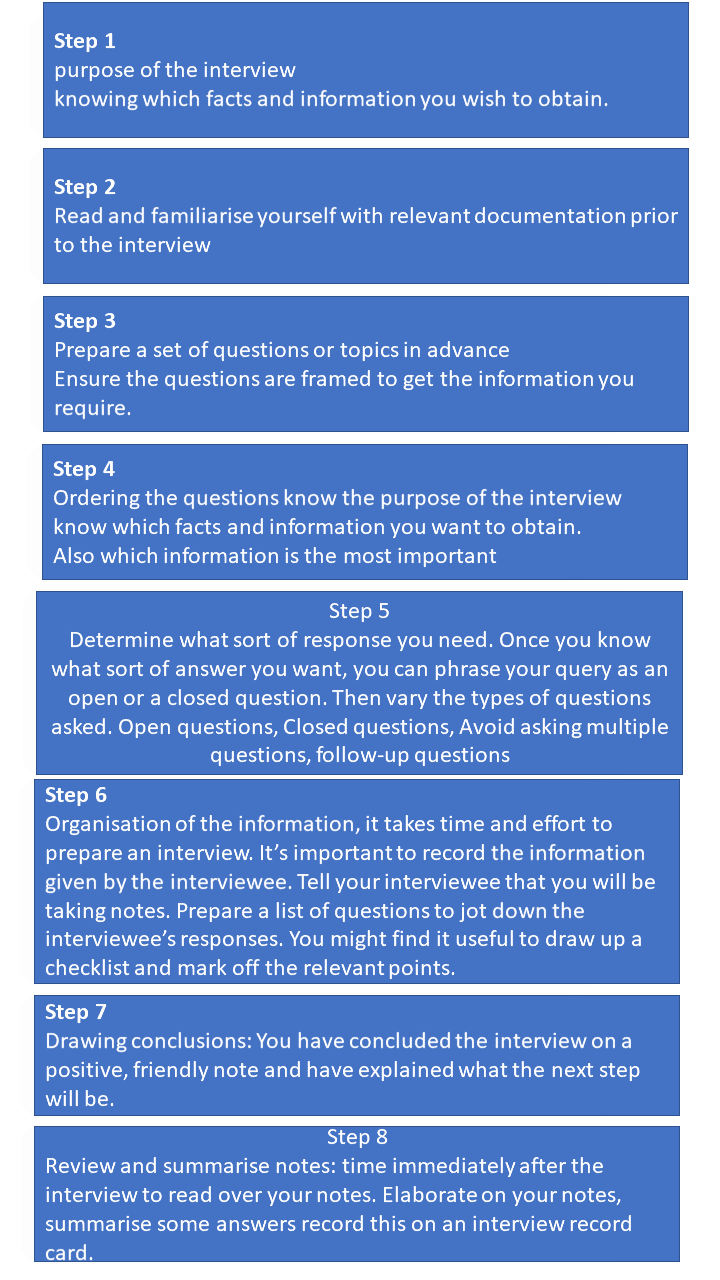
Interviews have been defined as “conversations with a purpose” and are another form of oral communication commonly encountered socially and in the workplace.
Different Types of Interviews
At different times during your career you will probably take the role of the interviewer and of the interviewee and participate in different types of interviews.

Characteristics of Formal and Informal Interviews
Any of the different types of interviews can be handled in different ways – formally, informally or using a mixture of the two.
|
Formal Interviews |
Informal interviews |
|
The interviewer establishes the goals of the situation early in the interaction. |
The interviewer allows the interviewee to control the purpose, pacing and subject matter of the interview. |
|
It provides for the exchange of specific information. |
More information can be gathered, but unnecessary information is generated. |
|
It gives the interviewer more control over the situation. |
The interviewer can lose control and end up having a nice conversation instead of getting the needed information. |
|
It reduces the interviewee’s response choices. |
It allows the interviewee the freedom to express him or herself freely. |
|
Less flexible. |
More flexible. |
|
More time-efficient. |
This approach can take more time. |
Some interviewers use some characteristics of both the formal and the informal interview to create “an informal formal” interview. For example, an interviewer may prefer an informal interview where more information is generated, but time may be an important factor. In such a case, some of the questions asked will require a specific response.
The interviewer will decide which type of interview to use after careful consideration of the purpose of the interview and the specific situation.
Planning and Background Research
The aim of an interview is to elicit specific information. If you are unprepared for an interview, you will make inefficient use of time, present a poor image and struggle to obtain the details you require.
To prepare yourself for an interview, you can follow these steps:

Step 1: Know the exact purpose of the interview. This includes knowing which facts and information you wish to obtain.
Step 2: Read and familiarise yourself with all the relevant documentation prior to the interview.
Step 3: Prepare a set of questions or topics in advance. Ensure that these questions are framed to get the information you require.
Step 4: Ordering the questions: Once you know the purpose of the interview, you know which facts and information you want to obtain. You also know which information is the most important.
How to order the questions
Always set the interviewee at ease by creating a pleasant atmosphere and asking questions of a general nature.
As you know which facts and information you want to obtain and the importance of this information, you will ask the questions in order of priority
Pay attention to the wording of each question. Communication may easily be blocked when the interviewer uses words and expressions beyond the interviewee’s understanding. Word meanings and usage are linked to socio-economic differences between people of different professions, cultural and educational environments.
Step 5:
Determine what sort of response you need. Once you know what sort of answer you want, you can phrase your query as an open or a closed question. Then vary the types of questions asked so that the interview is more interesting – for you and the interviewee!
Open questions ask for broad or general information and there are few restrictions on how the interviewee might answer. Here are some examples: Tell me about yourself; what sort of relationship did you have with your colleagues? What does the company policy on absenteeism mean to you?
Closed questions are specific and restrict the options available to the interviewee. Multiple choice questions, questions that require a Yes or a No answer and questions where there is only one correct answer are types of closed questions. Here are some examples: Do you prefer administration or communicating with clients? Do you agree with the proposal? How old are you?
Avoid asking multiple questions. By asking two or three questions one after the other, and only asking for a response when you have finished the questions, you will probably not get a satisfactory answer to any of them.
If there are any areas of uncertainty, make use of follow-up questions to probe in more depth and obtain clarification.
As you can see, it is essential to spend time and effort on preparing the questions for an interview.
Step 6:
Organisation of the information elicited: As you have seen, it takes time and effort to prepare for a well-structured interview. It is vital that you record the information obtained from the interviewee.
Tell your interviewee that you will be taking notes and then do this as unobtrusively as possible. In this way, you will have a record of the relevant information and important points.
If you prepared a list of questions next to each topic that you intend covering, you can jot down the interviewee’s responses.
You might find it useful to draw up a checklist and mark off the relevant points. For example, if you are interviewing someone for a job, you could have a list of qualities that you feel are essential for that position.
Step 7: Drawing conclusions: You have concluded the interview on a positive, friendly note and have explained what the next step will be.
Step 8:
Review and summarise notes: It is important for you to take some time immediately after the interview to read over your notes. Then you may need to elaborate on your notes, summarise some answers and/or record factual information. You could record this on an interview record card. (See example below)
Review the facts and information that you obtained.
Make a note of your feelings and impressions.
This process is vital, especially if you conduct several interviews in succession. These detailed, objective notes will help you to remember information about each candidate or employee. They also prove invaluable if you have to share this information with anyone else or if any decisions have to be made.
Example of an interview record card:
